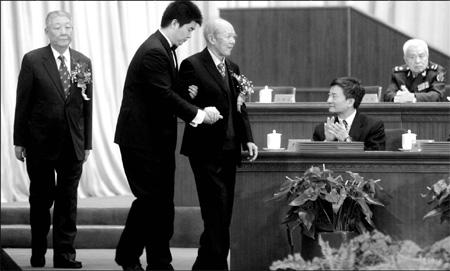Premier WEN Jiabao yesterday called for scientific innovation to help the country cope with the global economic downturn and serve as an impetus to realize lasting economic prosperity.
 |
|
Gu Chaohao (third from left), a mathematician, and space scientist Sun Jiadong (first left) receive the top science honor at the Great Hall of the People in Beijing yesterday. [Chun Qiu/China Daily] |
He made the call at a grand ceremony to present the 2009 State Top Scientific and Technological Award.
WEN said greater efforts should be made to embrace global scientific and technological development and build China into an innovation-driven economy.
Independent innovation should always play a key part in economic restructuring and transformation of the country's development pattern, he said.Efforts should be made to achieve scientific breakthroughs on issues related to people's living standards, national security and competitive power.
WEN called for intensified efforts to develop new emerging industries such as new energy resources, information and the Internet as well as life sciences.
He also underlined the importance of training scientific talents to provide support for the country's modernization drive.
GU Chaohao, a mathematician, and space scientist SUN Jiadong received the top science honor yesterday for their outstanding contributions to scientific and technological innovation.
But the announcement generated mixed feelings among academics.
The life stories of established scientists are a reminder many university faculty should spend more time on research than on reputation and salary.
Chinese universities have strengthened efforts in anti-academic corruption and fraud following a recent revelation of 70 fake academic papers from Jinggangshan University in East China.
In addition to the questionable academic environment, the current rigid education system has also been held responsible for the scarcity of international renowned scientists including late scientist QIAN Xuesen, who is considered the father of the Chinese space program.
"One of the major reasons why Chinese science and technology are not well developed, is because no universities have been built to nurture creative talents," QIAN told Premier WEN Jiabao during WEN's visit to the hospital.
"Lack of creativity and lack of outstanding talents are the major issues," the scientist said.
"China's evaluation system of a scholar or a researcher's work that focuses on the number of published papers rather than the quality have played a role in the shortage of world-leading, innovative scientists and scholars," said CUI Zhiwei, a mathematics lecturer in a leading university in Beijing.
But CUI said the award sends a message that the government has put the development of theoretical sciences on its top agenda.
"It is also encouraging for young researchers like us to see the bright prospects of doing theoretical research." (China Daily)





